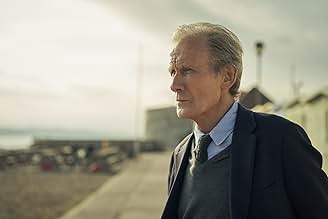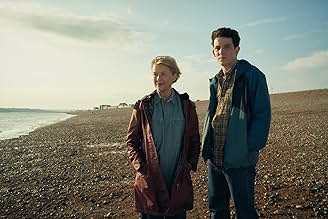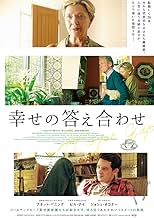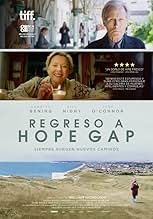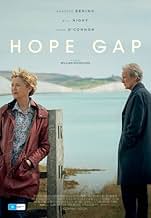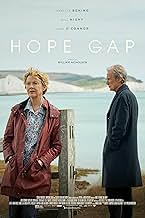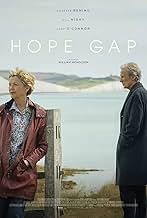IMDb-BEWERTUNG
6,7/10
6712
IHRE BEWERTUNG
Jamies Besuch in seinem Elternhaus nimmt eine unerwartet dramatische Wendung, als Vater Edward ihm sagt, dass er seine Frau Grace nach 29 Ehejahren verlassen wird. Die völlig überraschte Gra... Alles lesenJamies Besuch in seinem Elternhaus nimmt eine unerwartet dramatische Wendung, als Vater Edward ihm sagt, dass er seine Frau Grace nach 29 Ehejahren verlassen wird. Die völlig überraschte Grace reagiert mit totaler Verdrängung.Jamies Besuch in seinem Elternhaus nimmt eine unerwartet dramatische Wendung, als Vater Edward ihm sagt, dass er seine Frau Grace nach 29 Ehejahren verlassen wird. Die völlig überraschte Grace reagiert mit totaler Verdrängung.
- Auszeichnungen
- 2 Gewinne & 2 Nominierungen insgesamt
Neilesh Ambu
- Funeral Guest
- (Nicht genannt)
Dawn Batty
- Pub Customer
- (Nicht genannt)
Anne Bryson
- Anne Bryson
- (Nicht genannt)
Jennifer Catford
- Driver
- (Nicht genannt)
Jonathan Cheetham
- Friendline Counselor
- (Nicht genannt)
Empfohlene Bewertungen
I think it was the accent (or something) but Annette Bening's vocal scenes were terrible and very off-putting. She reminded me of Maggie Gyllenhaal in that TV series a few years back (The Honourable Woman). The accent was very affected; like an American taught them the way they think an English person speaks. But in Honourable Woman, the accent seems to be more suited to the role. Not in this movie. Overall it was okay, but Annette Bening's accent was hard to overlook.
Hope Gap
The title put me off viewing this but when I finally did this was very good.
A tight script with even tighter acting, the great revelation being the total lack of insight Grace, played by Annette Benning, showed in her understanding of her behaviour to others. I am even unclear even at the end of the movie that she had made any progress on this point and this was where her personal redemption lay. I am glad she got what she deserved when the worm turned!
With that said it had great insight into the human condition and I really enjoyed the whole thing.
I'm giving this a hard 7 for the nuance of delivery by Benning it was an acting masterclass.
The title put me off viewing this but when I finally did this was very good.
A tight script with even tighter acting, the great revelation being the total lack of insight Grace, played by Annette Benning, showed in her understanding of her behaviour to others. I am even unclear even at the end of the movie that she had made any progress on this point and this was where her personal redemption lay. I am glad she got what she deserved when the worm turned!
With that said it had great insight into the human condition and I really enjoyed the whole thing.
I'm giving this a hard 7 for the nuance of delivery by Benning it was an acting masterclass.
"Say not the struggle nought availeth, the labour and the wounds are vain, the enemy faints not, nor faileth, and as things have been they remain."
An important passage of one of Arthur Hugh Clough's most recognized poems, is easily one of the most important messages from William Nicholson's long awaited sophomore feature Hope Gap. A story about hope, persistence and hard work for the things in life that matter the most, Hope Gap is a small film, but size never seems to be a determining factor of poignancy. Just like a well written poem, Hope Gap is a little piece of reality for the struggles, hardships and sometimes, maybe even often times, emotionally violent feats one may take to overcome heartbreak.
Upon watching Hope Gap, I found the film resonating very deep within my heart and soul. Having endured a heartfelt and emotional withering of my own relationship, the film treads lightly the very real and hard to swallow realities of moving on.
Plot wise, the film is a very familiar story. As the film opens up, we are quickly introduced to a very simple family; Edward (Bill Nighy) a professor at a local school, Grace, religious mother and poet enthusiast (Annette Bening) and their tech-savvy son Jamie (Jack O'Connor), who has recently moved away from his parents quaint seaside town and into the city. Upon the arrival of Grace and Edward's twenty-ninth wedding anniversary, an elderly Edward (Bill Nighy) informs Grace that he is leaving him for another woman.
As the unravelling of Grace and Edward's marriage begins, very simple yet complex themes of happiness, communication and relationships encompass the film. Within the first ten minutes of the film, Grace and Edward's relationship is spotlighted by how a lack of communication shows how their relationship begins to wither. Discussion of a simple anniversary dinner date, as well as a belief and faith in God shows both of their large differences in the relationship pushes Edward away. Grace, who is so passionate and feisty, laments her own emotions onto Edward, who, lifelessly and aimlessly just goes through the motions of the final days of their marriage. It becomes quite clear that the routine, repetitiveness and familiarity of Edward's life with Grace takes a toll on how he sees his future may be, and therefore rejects and denies it when he begins to fall in love with another woman.
Nicholson's script and direction is super tight and extremely relatable in a time where the large gaps between generations, especially between parents and children, are more visible than ever. Nicholson uses his very talented cast, moistly in Bening and Nighy, as well as the highly underrated O'Connor showcase their acting skills in nuanced yet powerful ways. Nicholson treads light waters and uses the weight of little things having value in relationships and how certain partners characteristics leads to problematic formulas of action/reaction and the lack thereof.
Hope Gap is wonderful film who's biggest enemy are not the cheaters, the faithfuls or the innocent bystanders who get caught in the cross-fires of love; the greatest enemy in Hope Gap are the fears that individuals tend to forget when it comes to growing a life, raising a family and getting older entails. These fears, like, being adequate companions to a spouse, projecting your beliefs onto your children, as well as the expectations people have for others, without expecting much from themselves, become the very fabrics of why Hope Gap succeeds as a portrait of a failed marriage, but also bridges the spaces of simple narrative storytelling.
Hope Gap isn't a movie you see, it's a movie you feel, similar to the way Edward explains to his wife how trying to force their son to believe in God is not the path he nor his son sees fit. "You don't tell love, you feel love", says Edward. Hinting early on in the film his very own emotions to a wife that seems deaf to his cries and pleas of change and growth.
One of the marvellous feats of Hope Gap is its ability to, although showcasing the faults and incompatibilities of each spouse to the audience as well as to each other, never makes either one of the partners a villain or a hero. Grace and Edward move on with their individual lives in manners that seem to not only evolve their characters, but also allow their son Jamie to find peace and happiness in the unfolding of his parents marital demise.
One of the most reoccurring dialogues in the film, is the idea of being happy and being fine. As Grace so eloquently states, "Fine isn't the same as happy" when discussing Jamie's love life in the city and his lack of companionship in his single flat, as well as Edward's responses whenever Grace asks him how his days are and how he is feeling. This simple use of narrative foreshadowing and these little bits of dialogue really pushes the points towards the fact that marriages are not easy; relationships are not simple, yet, its the decisions made between two people and the actions of their love that bridges the gap towards the idea that their love, their failed marriage and the time spent together, brought them their greatest accomplishment, their son.
It is quite obvious that Hope Gap may not be the happiest film you may see in 2020, but it sure is one damn fine film.
Upon watching Hope Gap, I found the film resonating very deep within my heart and soul. Having endured a heartfelt and emotional withering of my own relationship, the film treads lightly the very real and hard to swallow realities of moving on.
Plot wise, the film is a very familiar story. As the film opens up, we are quickly introduced to a very simple family; Edward (Bill Nighy) a professor at a local school, Grace, religious mother and poet enthusiast (Annette Bening) and their tech-savvy son Jamie (Jack O'Connor), who has recently moved away from his parents quaint seaside town and into the city. Upon the arrival of Grace and Edward's twenty-ninth wedding anniversary, an elderly Edward (Bill Nighy) informs Grace that he is leaving him for another woman.
As the unravelling of Grace and Edward's marriage begins, very simple yet complex themes of happiness, communication and relationships encompass the film. Within the first ten minutes of the film, Grace and Edward's relationship is spotlighted by how a lack of communication shows how their relationship begins to wither. Discussion of a simple anniversary dinner date, as well as a belief and faith in God shows both of their large differences in the relationship pushes Edward away. Grace, who is so passionate and feisty, laments her own emotions onto Edward, who, lifelessly and aimlessly just goes through the motions of the final days of their marriage. It becomes quite clear that the routine, repetitiveness and familiarity of Edward's life with Grace takes a toll on how he sees his future may be, and therefore rejects and denies it when he begins to fall in love with another woman.
Nicholson's script and direction is super tight and extremely relatable in a time where the large gaps between generations, especially between parents and children, are more visible than ever. Nicholson uses his very talented cast, moistly in Bening and Nighy, as well as the highly underrated O'Connor showcase their acting skills in nuanced yet powerful ways. Nicholson treads light waters and uses the weight of little things having value in relationships and how certain partners characteristics leads to problematic formulas of action/reaction and the lack thereof.
Hope Gap is wonderful film who's biggest enemy are not the cheaters, the faithfuls or the innocent bystanders who get caught in the cross-fires of love; the greatest enemy in Hope Gap are the fears that individuals tend to forget when it comes to growing a life, raising a family and getting older entails. These fears, like, being adequate companions to a spouse, projecting your beliefs onto your children, as well as the expectations people have for others, without expecting much from themselves, become the very fabrics of why Hope Gap succeeds as a portrait of a failed marriage, but also bridges the spaces of simple narrative storytelling.
Hope Gap isn't a movie you see, it's a movie you feel, similar to the way Edward explains to his wife how trying to force their son to believe in God is not the path he nor his son sees fit. "You don't tell love, you feel love", says Edward. Hinting early on in the film his very own emotions to a wife that seems deaf to his cries and pleas of change and growth.
One of the marvellous feats of Hope Gap is its ability to, although showcasing the faults and incompatibilities of each spouse to the audience as well as to each other, never makes either one of the partners a villain or a hero. Grace and Edward move on with their individual lives in manners that seem to not only evolve their characters, but also allow their son Jamie to find peace and happiness in the unfolding of his parents marital demise.
One of the most reoccurring dialogues in the film, is the idea of being happy and being fine. As Grace so eloquently states, "Fine isn't the same as happy" when discussing Jamie's love life in the city and his lack of companionship in his single flat, as well as Edward's responses whenever Grace asks him how his days are and how he is feeling. This simple use of narrative foreshadowing and these little bits of dialogue really pushes the points towards the fact that marriages are not easy; relationships are not simple, yet, its the decisions made between two people and the actions of their love that bridges the gap towards the idea that their love, their failed marriage and the time spent together, brought them their greatest accomplishment, their son.
It is quite obvious that Hope Gap may not be the happiest film you may see in 2020, but it sure is one damn fine film.
This is not the best film you will ever see but it may possibly be the best portrayal of a love-less marriage and the finding of real love you may ever see on screen. Someone in amongst the writers, Director etc has experience the emotions on show here and the cast bring them to life in a very easy, simple way. Bening is truly wonderful in her performance, I actually felt hate for her character. How she missed an award is beyond me.
I felt the response by Angela at the end perfectly summed up the whole situation.
Worth a watch this one
I once sat in a bar with my ex-girlfriend and Carly Simon's 'You're So Vain" came on the jukebox.
"This song reminds me of you." she said.
"I'm guilty of lots of things, but vanity isn't one of them."
"No, you're not vain. It's a line in the song. Listen, see if you know which one..."
""You gave away the things you love and one of them was me.""
"Yes."
It's one of the saddest things anyone has ever said to me. But it wasn't true. She pushed me away, and I left.
The film is an honest, quiet, devastating story of the sort of love many people experience. The regrettable sort. People can live without the respect of others, but when that disrespect starts to erode your own self-respect, you need to leave. Some of us should never fall in love.
A decent film with good performances from all. The ending is lovely.
The film is an honest, quiet, devastating story of the sort of love many people experience. The regrettable sort. People can live without the respect of others, but when that disrespect starts to erode your own self-respect, you need to leave. Some of us should never fall in love.
A decent film with good performances from all. The ending is lovely.
Wusstest du schon
- WissenswertesBased on William Nicholson's own life experience, when his own parents marriage broke down after 33 years.
- PatzerThere is a jar of Marmite (a savoury spread popular in the UK) on a shelf in the kitchen. It alternates between two orientations: it is side-on when Bill Nighy is in close-up but when Annette Bening is also in view the back of the jar is turned to the camera.
- SoundtracksMozart: 1, Kyrie [Mass in C minor, K.427 'Grosse Messe']
Written by Wolfgang Amadeus Mozart
Performed by Sylvia McNair, Diana Montague, Anthony Rolfe-Johnson, Cornelius Hauptmann, The Monteverdi Choir, English Baroque Soloists, John Eliot Gardiner
Top-Auswahl
Melde dich zum Bewerten an und greife auf die Watchlist für personalisierte Empfehlungen zu.
Details
- Erscheinungsdatum
- Herkunftsländer
- Offizieller Standort
- Sprache
- Auch bekannt als
- Hope Gap
- Drehorte
- Produktionsfirmen
- Weitere beteiligte Unternehmen bei IMDbPro anzeigen
Box Office
- Bruttoertrag in den USA und Kanada
- 104.732 $
- Eröffnungswochenende in den USA und in Kanada
- 30.978 $
- 8. März 2020
- Weltweiter Bruttoertrag
- 1.254.346 $
- Laufzeit
- 1 Std. 40 Min.(100 min)
- Farbe
- Seitenverhältnis
- 2.39:1
Zu dieser Seite beitragen
Bearbeitung vorschlagen oder fehlenden Inhalt hinzufügen







